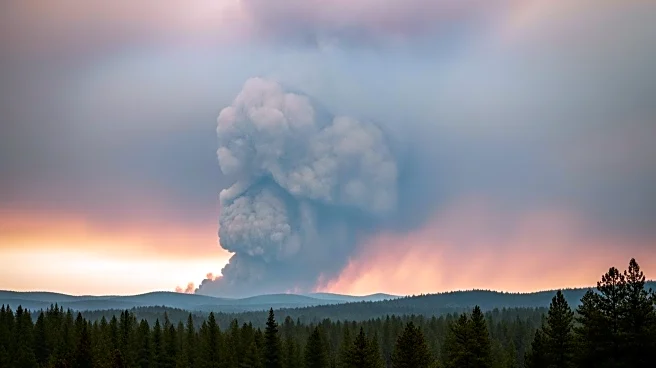What is the story about?
What's Happening?
A recent study published in Nature has revealed that smoke from Canadian wildfires in 2023 was responsible for 82,000 deaths worldwide, including the tragic death of nine-year-old Carter Vigh in British Columbia. The study highlights the severe impact of tiny toxic particles, known as PM2.5, emitted by the wildfires, which affected air quality across Canada, the United States, and Europe. Carter, who had asthma, succumbed to an asthma attack exacerbated by the smoke, despite precautions taken by his family. The wildfires increased PM2.5 exposure by 65% in Canada, 21% in the US, and 4% in Europe. Experts warn that the death toll may be underestimated, as wildfire PM2.5 is potentially more toxic than other sources of PM2.5.
Why It's Important?
The findings underscore the significant health risks posed by wildfire smoke, which is increasingly recognized as a major threat to public health. The study adds to existing evidence linking air pollution from wildfires to millions of deaths annually. The widespread impact of the Canadian wildfires highlights the urgent need for improved air quality monitoring and public awareness. The initiative started by Carter's mother, Amber Vigh, to distribute air quality monitors in Canada, exemplifies grassroots efforts to address these challenges. The study calls for more robust government action to mitigate the health impacts of wildfire smoke.
What's Next?
Amber Vigh's initiative with the BC Lung Foundation aims to expand the distribution of air quality monitors across Canada, potentially saving lives by providing real-time data on air pollution levels. The study's findings may prompt policymakers to enhance air quality monitoring systems and develop strategies to protect vulnerable populations during wildfire events. As wildfires become more frequent and intense due to climate change, there is a growing need for international cooperation to address the health impacts of transboundary air pollution.
Beyond the Headlines
The study raises ethical and legal questions about the responsibility of governments and industries in contributing to climate change and its health impacts. The increasing frequency of wildfires, driven by fossil fuel pollution and global warming, highlights the need for sustainable environmental policies. The tragic death of Carter Vigh serves as a poignant reminder of the human cost of environmental neglect, prompting discussions on the balance between economic development and environmental protection.
















